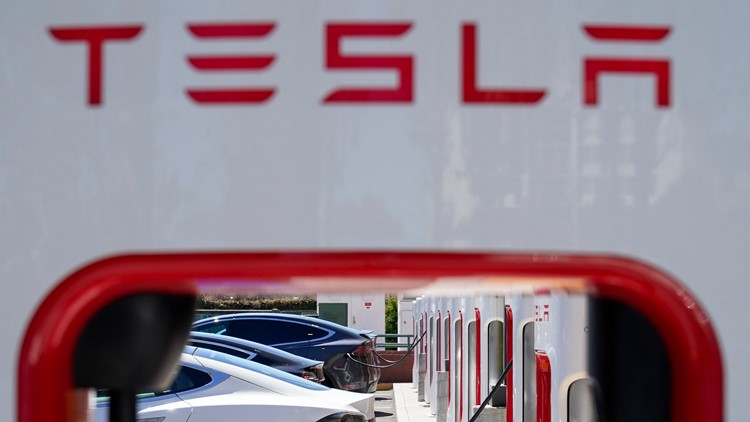DETROIT — Just before 2 a.m. on a chilly April night in Seattle, a Chevrolet Silverado pickup stopped at an electric vehicle charging station on the edge of a shopping center parking lot.
Two men, one with a light strapped to his head, got out. A security camera recorded them pulling out bolt cutters. One man snipped several charging cables; the other loaded them into the truck. In under 2½ minutes, they were gone.
The scene that night has become part of a troubling pattern across the country: Thieves have been targeting EV charging stations, intent on stealing the cables, which contain copper wiring. The price of copper is near a record high on global markets, which means criminals stand to collect rising sums of cash from selling the material.
The stolen cables often disable entire stations, forcing EV owners on the road to search desperately for a working charger. For the owners, the predicament can be exasperating and stressful.
Broken-down chargers have emerged as the latest obstacle for U.S. automakers in their strenuous effort to convert more Americans to EVs despite widespread public anxiety about a scarcity of charging stations. About 4 in 10 U.S. adults say they believe EVs take too long to charge or don’t know of any charging stations nearby.
If even finding a charging station doesn't necessarily mean finding functioning cables, it becomes one more reason for skeptical buyers to stick with traditional gasoline-fueled or hybrid vehicles, at least for now.
America's major automakers have made heavy financial bets that buyers will shift away from combustion engines and embrace EVs as the world faces the worsening consequences of climate change. Accordingly, the companies have poured billions into EVs.
Stellantis envisions 50% of its passenger cars being EVs by the end of 2030. Ford set a target of producing 2 million EVs per year by 2026 — about 45% of its global sales — though it has since suspended that goal. General Motors, the most ambitious of the three, has pledged to sell only EV passenger cars by the end of 2035.
Any such timetables, of course, hinge on whether the companies can convince more would-be EV buyers that a charge will always be available when they travel. The rise in cable thefts isn't likely to strengthen the automakers' case.
Two years ago, according to Electrify America, which runs the nation’s second-largest network of direct-current fast chargers, a cable might be cut perhaps every six months at one of its 968 charging stations, with 4,400 plugs nationwide. Through May this year, the figure reached 129 — four more than in all of 2023. At one Seattle station, cables were cut six times in the past year, said Anthony Lambkin, Electrify America's vice president of operations.
"We’re enabling people to get to work, to take their kids to school, get to medical appointments," Lambkin said. “So to have an entire station that’s offline is pretty impactful to our customers.”
Two other leading EV charging companies — Flo and EVgo — also have reported a rise in thefts. Charging stations in the Seattle area have been a frequent target. Sites in Nevada, California, Arizona, Colorado, Illinois, Oregon, Tennessee, Texas and Pennsylvania have been hit, too.
Stations run by Tesla, which operates the nation's largest fast-charging network, have been struck in Seattle, Oakland and Houston. So far this year, Seattle police have reported seven cases of cable thefts from charging stations, matching the number for all of 2023. Thieves hit Tesla stations four times this year compared with just once last year, the Seattle police said.
“Vandalism of public charging infrastructure in the Seattle metro area has unfortunately been increasing in frequency," EVgo said.
The company said law enforcement officials are investigating the thefts while it tries to repair inoperable stations and considers a longer-term solution.
The problem isn't confined to urban areas. In rural Sumner, Washington, south of Seattle, thieves cut cables twice at a Puget Sound Energy charging station. The company is working with police and the property owner to protect the station.
Until a month ago, police in Houston knew of no cable thefts. Then one was stolen from a charger at a gas station. The city has now recorded eight or nine such thefts, said Sgt. Robert Carson, who leads a police metal-theft unit.
In one case, thieves swiped 18 of 19 cords at a Tesla station. That day, Carson visited the station to inspect the damage. In the first five minutes that he was there, Carson said, about 10 EVs that needed charging had to be turned away.
In very large cities like Houston, charging stations typically contain an especially large number of plugs and cables, so thefts can be particularly damaging.
“They're not just taking one," Carson said. "When they're hit, they're hit pretty hard.”
Roy Manuel, an Uber driver who normally recharges his Tesla at the Houston station hit by thieves, said he fears being unable to do so because of stolen cables.
“If my battery was really low, I’d have quite an issue with operating my vehicle,” he said. “If it was so low that I couldn’t get to another charger, I might be in trouble. Might even need a tow truck.”
The charging companies say it's become clear that the thieves are after the copper that the cables contain. In late May, copper hit a record high of nearly $5.20 a pound, a result, in part, of rising demand resulting from efforts to cut carbon emissions with EVs that use more copper wiring. The price is up about 25% from a year ago, and many analysts envision further increases.
Charging companies say there isn't actually very much copper in the cables, and what copper is there is difficult to extract. Carson estimates that criminals can get $15 to $20 per cable at a scrap yard.
"They're not making a significant amount of money,” he said. “They're not going to be sailing on a yacht anywhere.”
Still, the more cables the thieves can steal, the more they can cash in. At $20 a cable, 20 stolen cables could fetch $400.
The problem for the charging companies is that it's much costlier to replace cables. In Minneapolis, where cables have been clipped at city-owned charging stations, it costs about $1,000 to replace just one cable, said Joe Laurin, project manager in the Department of Public Works.
The charging companies are trying to fight back. Electrify America is installing more security cameras. In Houston, police are visiting recycling centers to look for stolen metal.
But it's often hard for the scrap yards to determine conclusively whether metal came from a charging cable. Thieves often burn off the insulation and just sell strands of metal.
The Recycled Materials Association, which represents 1,700 members, is issuing scrap-theft alerts from law enforcement officials so that members can be on the lookout for suspects and stolen goods.
Because charging stations are often situated in remote corners of parking lots, Carson suggested that many more security cameras are needed.
In the meantime, Electrify America said Seattle police are trying to track down the thieves in the video. And Carson said the Houston police are pursuing leads in the Tesla theft.
“We'd like to get them stopped," he said, “and then let the court system do what they're supposed to do.”



